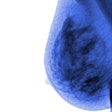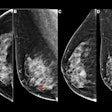Women with screen-detected breast cancer who missed their previous mammography appointment may have worse outcomes, such as larger tumors and poorer disease-specific survival rates, than those who did not, researchers have reported.
“These findings suggest that for these women, having missed the most recent screening before the diagnostic round could have led to a meaningful delayed detection of breast cancer,” wrote a team led by Xinhe Mao, PhD, from the Karolinska Institute in Stockholm, Sweden. The study results were published October 3 in JAMA Network Open.
Women with screen-detected breast cancer are more likely to show less aggressive tumor characteristics, leading to a better prognosis. However, many women do not regularly attend their breast screening appointments.
Mao and colleagues studied whether women diagnosed with screen-detected breast cancer who missed the screening round immediately before the diagnostic round experienced delays in cancer detection. They also studied whether tumor characteristics vary in these women.
The study included 8,602 women who were included in the Breast Cancer Quality Register and the Stockholm Mammography Screening Program. Of the women, 1,482 (17.2%) did not attend the immediate past screening.
The researchers reported the following:
Women who did not take part in their immediate past screening were more likely to have larger tumors (adjusted odds ratio [AOR], 1.55 for a tumor size of 20 mm or larger), lymph node involvement (AOR, 1.28), and distant metastasis (AOR, 4.64).
Women who missed their immediate previous screening were less likely to have estrogen receptor-negative breast cancer (AOR, 0.74).
Progesterone receptor status (AOR, 0.96) and ERBB2 (formerly HER2 or HER2/neu) status (AOR, 1) did not significantly differ between participants and nonparticipants.
Women who missed their immediate previous screening had poorer breast cancer-specific survival, with an adjusted hazard ratio (AHR) of 1.33.
The team found no significant associations after adjusting its analysis for tumor characteristics (AHR, 1.11). It also found no association between not taking part in the second-to-last screening and tumor characteristics among women with screen-detected breast cancers (AHR, 0.98 for stage II tumors or higher).
The authors highlighted that their results reinforce the importance of regular participation in breast cancer screening. They called for future studies to find out whether shorter screening intervals could help women who missed their last screening with earlier cancer detection.
“These results underscore the potential value of targeted interventions for high-risk groups, such as offering shorter re-invitation intervals or additional outreach following a missed screening appointment,” they wrote.
Read the entire study here.




















